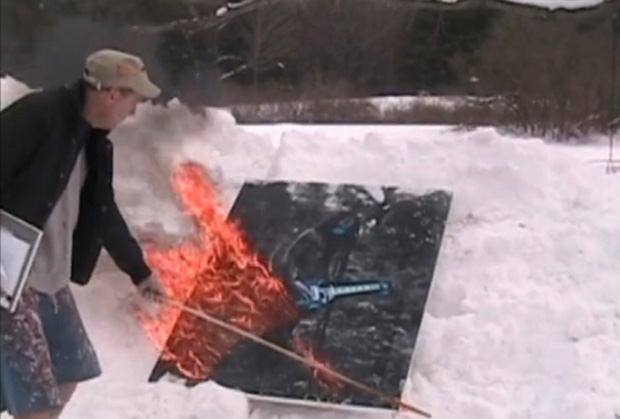
Has Richard Prince burned his disputed paintings?
A new video apparently depicts the artist torching his work Graduation - "to show the guy what I'm prepared to do"
Richard Prince appears to be winning the case brought against him by the French photojournalist Patrick Cariou regarding his Canal Zone series of paintings. So why does he appear to be burning the disputed works?
In 2011, a court ruled in favour of Cariou, who claimed Prince had appropriated images from his 2000 book, Yes Rasta. However, as we reported a few weeks back, on appeal another judge in a higher court has since largely found in Prince's favour, ruling that most images met the fair use criteria for exception from copyright protections.
{media1}
The earlier judgment gave Cariou the right to destroy unsold Prince paintings featuring his pictures. However, the subsequent appeal found that only five works by Prince featuring Cariou's pictures might not qualify for a fair use exemption, which permits limited borrowing of protected material for purposes such as commentary, criticism, news reporting and scholarship.
A lower court will decide whether these remaining works - which includes the painting Graduation - qualify for fair use. Yet, could Prince have preempted this judgment, by apparently destroying the works?
Galleristny has posited the theory that the footage, which appeared on the Vimeo account of video editor Ed Yonaitis, could form part of a longer documentary. The film, posted here, though password protected, apparently shows Prince torching the painting, while his commentary explains that he's destroyed it "just to show the guy [Cariou] what I'm prepared to do. If he's really serious about this lawsuit, which, unfortunately, he is." It's rather difficult to ascertain when the video was shot (the painting is resting on what appears to be snow) or why it's surfaced at this point. There is of course, the question of whether the painting is in fact the real item or a copy.
We'll hopefully post a copy of the footage, courtesy of Prince's office, once America wakes up. Until then, take a look at our Richard Prince monograph, which offers a great career overview of a brilliant and (still) controversial artist.